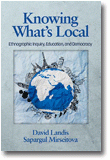
Knowing What’s Local
Ethnographic Inquiry, Education and Democracy
By:
David Landis, KIMEP University
Sapargul Mirseitova, Kazakhstan Reading Association
Published 2014
Ethnographic inquiry serves as a unique educational resource that is accessible to students and teachers of all economic and social classes and therefore well suited to building democratic communities in the 21st Century. This book is about teachers, students and parents in the Republic of Kazakhstan who opened new educational directions and democratic possibilities for themselves through a series of ethnographic studies about their local communities.
By unfolding practical experiences of teachers and students with ethnographic study, this book builds and expands understanding about education and democracy across five points of view:
• Renewing professional development and building academic knowledge through ethnographic inquiry
• Acquiring democratic living through ethnographic study of participatory, caring citizenship
• Connecting democratic ways of life with ethnographic study of identity formation in diverse communities
• Building knowledge about democratic perspectives through reflexive reading and writing about ethnographic inquiry
• Building meaningful education at the intersections of ethnographic inquiry, literacy practices and theorizing about local communities
The authors propose that teacher and student-led ethnographic inquiries develop educational experiences that enrich educators’ professional growth and provide innovative research opportunities for them and their students that generate up-to-date academic knowledge, which can be used to inform course offerings, design lessons and address state policy mandates.
CONTENTS
Foreword. Introduction. PART I: Principles for Developing and Supporting Teachers and Students’ Ethnographic Inquiries 1 Why Ethnographic Writing Attracts Teachers and Students. 2 Opportunities for Teaching and Learning from Ethnographic Inquiry in a Local Community. PART II: Building Teaching and Learning for Democratic Living Through Ethnographic Inquiry 3 Learning About Democracy Through Ethnographic Study of Citizenship in Local Communities. 4 Learning About Democracy Through Ethnographic Study of Community Formation. 5 Connections Between Ethnographic Learning and Reading and Writing Education. PART III: Creating Educational Knowledge Around Everyday People and Ordinary Lives 6 Almaty and Columbus: Theorizing the Local. Appendix A: Code of Ethics and Sample Letter for Ethnographic Inquiry in Local Communities.
-
Paperback9781623968441
Web price: $45.04 (Reg. 52.99)
-
Hardcover9781623968458
Web price: $80.74 (Reg. 94.99)
- eBook9781623968465

- EDU000000 - EDUCATION: General
- EDU022000 - EDUCATION: Parent Participation
- EDU029040 - EDUCATION: TEACHING METHODS & MATERIALS: Social Science
-
 (Re)Envisioning Social Studies Education Research
Current Epistemological and Methodological Expansions, Deconstructions, and Creations
(Re)Envisioning Social Studies Education Research
Current Epistemological and Methodological Expansions, Deconstructions, and Creations
-
 Beyond Single Stories
Changing Narratives for a Changing World
Beyond Single Stories
Changing Narratives for a Changing World
-
 Distance Learning
Volume 20 #3
Distance Learning
Volume 20 #3
-
 Distance Learning
Volume 20 #4
Distance Learning
Volume 20 #4
-
 Healing While Studying
Reflections and Strategies for Healing, Coping, and Liberation of Graduate Students of Minoritized Identities
Healing While Studying
Reflections and Strategies for Healing, Coping, and Liberation of Graduate Students of Minoritized Identities
-
 Rekindling Embers of the Soul
An Examination of Spirituality Issues Relating to Teacher Education
Rekindling Embers of the Soul
An Examination of Spirituality Issues Relating to Teacher Education
-
 Teaching Peace Through Popular Culture
2nd Edition
Teaching Peace Through Popular Culture
2nd Edition

